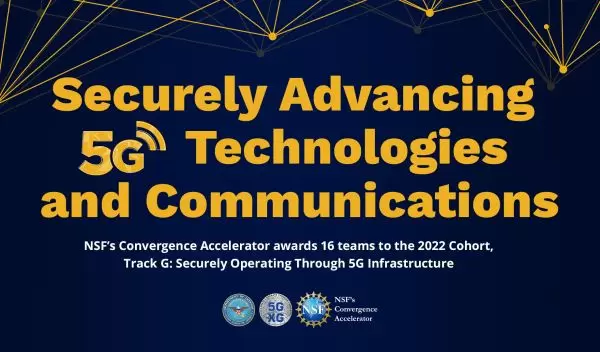
NSF, DOD partner to advance 5G technologies and communications for U.S. military, government and critical infrastructure operators
The U.S. National Science Foundation is accelerating 5G solutions to assist the U.S. government and critical infrastructure operators to communicate securely anywhere and anytime.
Partnering with the Department of Defense Office of the Under Secretary of Defense for Research and Engineering, or DOD OUSD(R&E) on an investment of $12 million, NSF has selected 16 multidisciplinary teams for the Convergence Accelerator program 2022 cohort for the research topic — Track G: Securely Operating Through 5G Infrastructure.
Track G builds upon DOD's 5G Initiative — Operate Through — to assess and mitigate 5G vulnerabilities, inform 5G standards and policies through rigorous research, and promote technology development to advance 5G communications for the U.S. military and federal government.
“5G wireless networks are crucial components of the modern communication system and a key aspect of how we operate,” said Amanda Toman, Acting Principal Director for 5G at DOD OUSD(R&E). “We must have viable solutions to support the military and federal government’s missions. The Department is excited to partner with NSF and its Convergence Accelerator to accelerate the development of 5G technologies for our systems and those of our allies and partners.”
Over the next nine months, each team will work to develop their initial idea into a proof of concept, identify new team members and partners, and participate in the unique Convergence Accelerator innovation curriculum. The innovation curriculum includes fundamentals in human-centered design; team science; use-inspired research; early-stage prototyping; and communications, storytelling and pitching. At the end of Phase 1, the teams will participate in a formal Phase 2 proposal and pitch. The oral pitch and formal proposal will be used in selecting teams for Phase 2 — a 24-month solution and sustainability development phase.
"This is the NSF Convergence Accelerator's fourth cohort, and we are pleased to be partnering with DOD on this important topic," said Douglas Maughan, head of the NSF Convergence Accelerator. "The NSF Convergence Accelerator is focused on solving some of the hardest national and societal challenges — designed to provide a positive societal and economic impact — and while this is our program's focus, we are thrilled to expand the program's model and fundamentals to address this national security challenge and to support the DOD’s 5G mission."
The Convergence Accelerator’s Track G: Securely Operating Through 5G Infrastructure overarching goal includes seeking enhancement to end devices and augmentations to 5G infrastructure, providing capabilities to military, government and critical infrastructure operators to operate through public 5G networks while meeting security and resilience requirements.
The awardees include:
-
5G Hidden Operations through Securing Traffic, or GHOST, led by University of Colorado Boulder.
-
5G Traffic Sovereignty: Operating Through an Adversarial Internet, led by University of California San Diego.
-
Autonomously Tunable Waveform-Agnostic Radio Adapter for Seamless and Secure Operation of DoD Devices Through Non-Cooperative 5G Networks, led by Florida International University.
-
Building Resilient and Secure 5G Systems, or BRASS, led by Red Balloon Security.
-
Combating Vulnerability and Unawareness in 5G Network Security: Signaling and Full-Stack Approach, led by University of Kansas.
-
Feasible Cooperative Zero Trust Framework for 5G, led by Blackberry Corporation.
-
Intelligent 5G Networks Designed and Integrated for Globalized Operations, or INDIGO, led by AT&T Corporation.
-
Lightweight Scalable Secure 5G and Beyond Networks, led by Novowi.
-
Security Services for the 5G Software-Defined Edge, led by SRI International.
-
Programmable Zero-Trust Security, or PETS, for Operating Through 5G Infrastructure, led by Texas A&M Engineering Experiment Station.
-
Privacy-preserving Intrusion-resilient Secure Multiparty-computation-based Overlay for Secure and Resilient Communication Through 5G, led by SRI International.
-
Proactive End-to-End Zero Trust-Based Security Intelligence for Resilient Non-cooperative 5G Networks, led by University of Michigan.
-
Secure Censor-resistant Overlay Resilient Networks, or SCORE, led by Peraton Labs.
-
Secure Texting over Non-cooperative Networks and Anti-jamming Enhancement in 5G, led by George Mason University.
-
Securely Operate through 5G Networks with Informed Control, or SONIC, led by the University of Utah.
-
SMART-5G: Secure Multichannel Automated opeRations Through 5G Networks, led by IBM, Consulting Federal.
Launched in 2019, the Convergence Accelerator — a Directorate for Technology, Innovation and Partnerships, or TIP, program — builds upon NSF's investment in basic research and discovery to accelerate solutions toward societal and economic impact. Convergence Accelerator multidisciplinary teams use convergence research fundamentals and innovation processes to stimulate innovative idea sharing and development of sustainable solutions.
More information about the Convergence Accelerator program is available at: https://beta.nsf.gov/funding/initiatives/convergence-accelerator.
